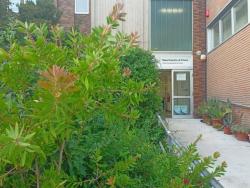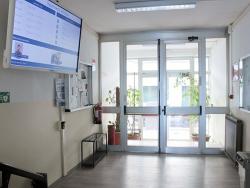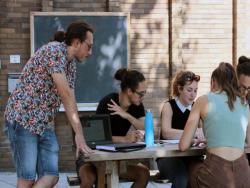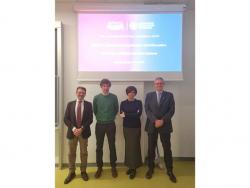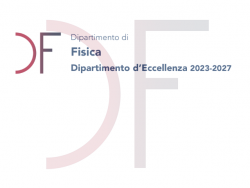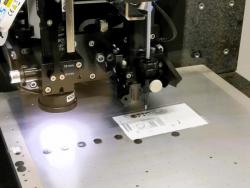- Home
- Dipartimento
- Ricerca
- Didattica
- Post Lauream
- Trasferimento della conoscenza
- Come fare per
Dipartimento di Eccellenza
Visiting Scientists
Le azioni per perseguire gli obiettivi del DdE sono supportate anche da un programma di inviti di visiting scientists da istituzioni di ricerca straniere. I visiting scientists contribuiscono alla didattica di alta qualificazione con cicli di seminari e lezioni per dottorandi e studenti di LM.
In seguito riportiamo una lista dei visiting scientists di cui è stata programmata una visita prossima, e di quelli che hanno già visitato il Dipartimento, con le informazioni relative all'attività svolta.
Elena Pierpaoli
(University of Southern California, Pasadena)
23 Giugno - 13 Luglio 2024
Linea di ricerca: HPC-BD-ML
Anna Bergamaschi
(PSI - Zurigo, CH)
Febbraio 2025
Linea di ricerca: LEA
Peter Skands
(Monash Univ., Melbourne)
Maggio-Giugno 2025
Linea di ricerca: LEA
Francisco Villaescusa-Navarro
(Simons Foundation, Center for Computational Astrophysics, New York)
tra metà Giugno e metà Luglio 2025
Linea di ricerca: HPC-BD-ML
Prof. Robert Alicki
International Center for Theory of Quantum Technologies (ICTQT), University of Gdansk (Poland)
4 marzo 2024 - 8 marzo 2024
Linea di ricerca: STQ
Colloquium:
"Cosmology without epicycles"
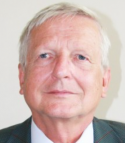 The four puzzles of cosmology, namely the origin of inflation and its termination, baryogenesis, acceleration of expansion and dark matter composition, are addressed within a new model which does not involve "epicycles" like inflaton fields with fine-tuned potentials or dark energy concept. The main assumption, motivated by the analysis of the reduced dynamics of open quantum systems embedded in the de Sitter space, is that the corresponding vacuum can be treated as a real, physical heat bath at the Gibbons-Hawking temperature proportional to the Hubble constant. This leads to the modified Friedmann equations for the Friedmann-Lemaitre-Robertson-Walker universe which predict the new mechanism of inflation and its graceful exit, mathematically similar to the model of superfluorescence in quantum optics, and additionally, a viable baryogenesis mechanism via gravitational anomaly. The same equations applied to the late Universe show inevitability of acceleration of expansion which in turn puts very specific limits on the particle spectrum beyond the Standard Model relevant for dark matter particles.
The four puzzles of cosmology, namely the origin of inflation and its termination, baryogenesis, acceleration of expansion and dark matter composition, are addressed within a new model which does not involve "epicycles" like inflaton fields with fine-tuned potentials or dark energy concept. The main assumption, motivated by the analysis of the reduced dynamics of open quantum systems embedded in the de Sitter space, is that the corresponding vacuum can be treated as a real, physical heat bath at the Gibbons-Hawking temperature proportional to the Hubble constant. This leads to the modified Friedmann equations for the Friedmann-Lemaitre-Robertson-Walker universe which predict the new mechanism of inflation and its graceful exit, mathematically similar to the model of superfluorescence in quantum optics, and additionally, a viable baryogenesis mechanism via gravitational anomaly. The same equations applied to the late Universe show inevitability of acceleration of expansion which in turn puts very specific limits on the particle spectrum beyond the Standard Model relevant for dark matter particles.
Prof. Dariusz Chruscinski
Institute of Physics, Nicolaus Copernicus University, Torun (Poland)
19 febbraio 2024 - 23 febbraio 2024
Linea di ricerca: STQ
Colloquium:
"Universal properties of relaxation rates for the irreversible dynamics of open quantum systems"
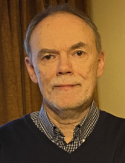 Open quantum systems, namely quantum systems in weak interaction with their environment, evolve irreversibly as manifested by typical relaxation rates, a general property of which is reviewed. It turns out that for a fairly large class of irreversible quantum dynamics, relaxation rates satisfy an intricate constraint which provides a generalization of the well known relation between transversal and longitudinal rates for 2-level systems. It is conjectured that this constraint is universal, i.e., it is valid for all quantum dynamical semigroups. The conjecture is strongly supported by numerical analysis. Moreover, it is shown that the conjectured constraint is tight. Since relaxation rates (or equivalently relaxation times) are often measured in the laboratory, this universality may be considered as a physical manifestation of complete positivity, a structural request necessary for physical consistency. The conjecture has also interesting implications: it provides a universal constraint for the spectra of quantum channels and gives rise to necessary conditions for Markovian channels.
Open quantum systems, namely quantum systems in weak interaction with their environment, evolve irreversibly as manifested by typical relaxation rates, a general property of which is reviewed. It turns out that for a fairly large class of irreversible quantum dynamics, relaxation rates satisfy an intricate constraint which provides a generalization of the well known relation between transversal and longitudinal rates for 2-level systems. It is conjectured that this constraint is universal, i.e., it is valid for all quantum dynamical semigroups. The conjecture is strongly supported by numerical analysis. Moreover, it is shown that the conjectured constraint is tight. Since relaxation rates (or equivalently relaxation times) are often measured in the laboratory, this universality may be considered as a physical manifestation of complete positivity, a structural request necessary for physical consistency. The conjecture has also interesting implications: it provides a universal constraint for the spectra of quantum channels and gives rise to necessary conditions for Markovian channels.
Prof. Lajos Diósi
Wigner Research Center for Physics & Eötvös Loránd University (Hungary)
16 ottobre 2023 - 21 ottobre 2023
Linea di ricerca: STQ
Seminario:
"Will quantum theory be different in the macro-world?"
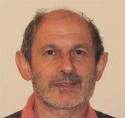 Quantum theory was invented for the microscopic world, and proved accurate there. Is it valid in the macroscopic world as well? Is quantum theory universal from particle physics to cosmology? We might like to think so. Except that the experimental evidences are lacking, the relevant theories limp along, and there are crippling conceptual problems. It is therefore not impossible that quantum theory will be different when it reaches the macro-world. But how different will it be? In quantum theory, the micro-world only affects the macro-world when a measurement is made on the micro-world. Wouldn't there exist certain spontaneous measurements, acting universally everywhere and everytime, negligibly weak in the micro-world and amplified in the macro-world? What does such a theory of spontaneous measurement (i.e., spontaneous wavefunction collapse) look like and what is it good for?
Quantum theory was invented for the microscopic world, and proved accurate there. Is it valid in the macroscopic world as well? Is quantum theory universal from particle physics to cosmology? We might like to think so. Except that the experimental evidences are lacking, the relevant theories limp along, and there are crippling conceptual problems. It is therefore not impossible that quantum theory will be different when it reaches the macro-world. But how different will it be? In quantum theory, the micro-world only affects the macro-world when a measurement is made on the micro-world. Wouldn't there exist certain spontaneous measurements, acting universally everywhere and everytime, negligibly weak in the micro-world and amplified in the macro-world? What does such a theory of spontaneous measurement (i.e., spontaneous wavefunction collapse) look like and what is it good for?
Prof. Alberto Imparato
Department of Physics and Astronomy, Aarhus University (Denmark)
27 agosto 2023 - 02 settembre 2023
Linea di ricerca: FSC
Seminario:
"Modelli di motori termici autonomi in prossimità di un punto critico: dinamica e termodinamica stocastica"
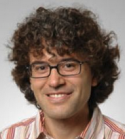 In un sistema all'equilibrio in prossimità di un punto critico la risposta ad una variazione di un campo esterno è significativamente alta. Partendo da questa considerazione, discuterò le proprietà di sistemi di motori autonomi microscopici in prossimità di una transizione di fase di seconda specie. In particolare considererò un modello di rotori su reticolo 2D in contatto con bagni a temperature differenti e un modello di Frenkel--Kontorowa fuori dall'equilibrio. Entrambi i modelli si comportano come motori termici, che convertono le correnti di calore fra i bagni in moto rotatorio o lineare. Nel mio seminario mostrerò che il regime di funzionamento ottimale si trova quando il gradiente di temperatura è applicato su un sistema in prossimità di una transizione di fase.
In un sistema all'equilibrio in prossimità di un punto critico la risposta ad una variazione di un campo esterno è significativamente alta. Partendo da questa considerazione, discuterò le proprietà di sistemi di motori autonomi microscopici in prossimità di una transizione di fase di seconda specie. In particolare considererò un modello di rotori su reticolo 2D in contatto con bagni a temperature differenti e un modello di Frenkel--Kontorowa fuori dall'equilibrio. Entrambi i modelli si comportano come motori termici, che convertono le correnti di calore fra i bagni in moto rotatorio o lineare. Nel mio seminario mostrerò che il regime di funzionamento ottimale si trova quando il gradiente di temperatura è applicato su un sistema in prossimità di una transizione di fase.
Ultimo aggiornamento: 06-05-2024 - 11:41


